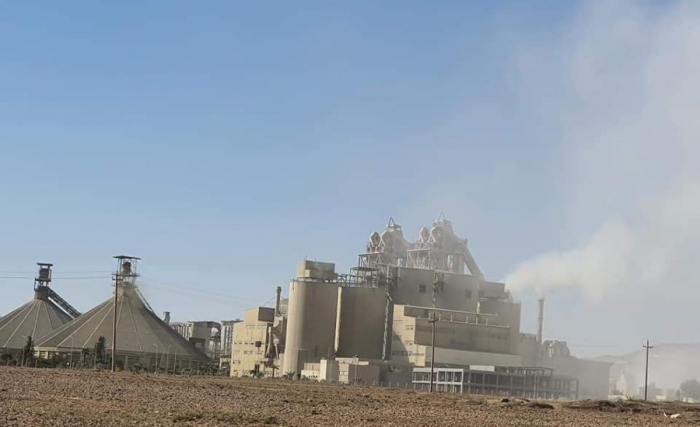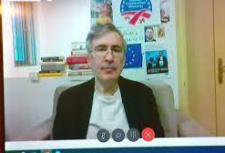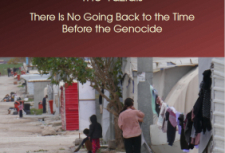The cement plant pollutes the ecology of the nearby Yezidi villages of Shangal

In Shangal, back in 1983, a cement plant was built using old technologies, with a production capacity of 3,000 tons per day and is one of the largest in Iraq. The plant is located just 12 km east of the district center of Sinjar.
There are Yezidi villages in the vicinity of the cement plant, residents of these villages complain about the smoke coming from the plant, which harms their health and agricultural crops. And at the same time, there are no jobs in factories for the Yezidi local population.
Qasem Muhammad, a resident of Bagchi village, located just 5 kilometers from the factory, says: "The vapors from the factory reach our village. Residents are sick, almost every village has cancer patients, and mortality among young people has increased. Our agricultural production has also decreased. We ask you to find a solution to this problem.
We have repeatedly asked the plant managers either to pay us compensation or to find a solution to the problem with the smoke emitted, but our efforts have led to nothing."
There is a shortage of electricity in the area, the station provides residents of this village with a small amount of electricity sufficient only for lighting houses.
According to international standards, from 30% to 40% of the plant's territory should be covered with greenery, but apart from the fact that there are no green spaces at the Sinjar Cement Factory, the plant's activities have also destroyed several kilometers of green areas around.
Also, one of the points related to the establishment of factories requires that the plant be located away from populated areas, but the Sinjar Cement Plant also did not take this condition into account.
Residents of nearby villages demand at least some benefit from the plant because they do not even have employment opportunities.
The plant is owned by the Government of Iraq and one of the investors. Work in it stopped during the period of ISIS control, but production resumed in 2017.
Director of the Sinjar cement plant Khalil Barakat, responding to the complaints of the population, said that smoke does not always rise from the plant, as locals say. According to him, a month ago a technical malfunction occurred at the plant, which led to an increase in air pollution and a large amount of smoke in the sky, but now the problem has been solved and there is no more smoke.
The assurances of the director of the Sinjar Cement Plant come at a time when the mayor of Sinjar district, Fahd Hamed, states that residents of this area have been complaining since 2017:
"The evaporation of the plant damaged farmers' crops, as well as pastures and livestock. Sometimes the sky of Sinjar darkens due to the density of factory smoke. It is extremely wrong for the factory to be in Sinjar, and workers were brought from Tal Afar, Mosul and other areas. It is unreasonable to have benefits for some, and harm Sinjar, but no one cares," said the mayor of Sinjar.
Tags: #yazidisinfo #newsyazidi #aboutyazidi #iraqyazidis
The cement plant pollutes the ecology of the nearby Yezidi villages of Shangal

In Shangal, back in 1983, a cement plant was built using old technologies, with a production capacity of 3,000 tons per day and is one of the largest in Iraq. The plant is located just 12 km east of the district center of Sinjar.
There are Yezidi villages in the vicinity of the cement plant, residents of these villages complain about the smoke coming from the plant, which harms their health and agricultural crops. And at the same time, there are no jobs in factories for the Yezidi local population.
Qasem Muhammad, a resident of Bagchi village, located just 5 kilometers from the factory, says: "The vapors from the factory reach our village. Residents are sick, almost every village has cancer patients, and mortality among young people has increased. Our agricultural production has also decreased. We ask you to find a solution to this problem.
We have repeatedly asked the plant managers either to pay us compensation or to find a solution to the problem with the smoke emitted, but our efforts have led to nothing."
There is a shortage of electricity in the area, the station provides residents of this village with a small amount of electricity sufficient only for lighting houses.
According to international standards, from 30% to 40% of the plant's territory should be covered with greenery, but apart from the fact that there are no green spaces at the Sinjar Cement Factory, the plant's activities have also destroyed several kilometers of green areas around.
Also, one of the points related to the establishment of factories requires that the plant be located away from populated areas, but the Sinjar Cement Plant also did not take this condition into account.
Residents of nearby villages demand at least some benefit from the plant because they do not even have employment opportunities.
The plant is owned by the Government of Iraq and one of the investors. Work in it stopped during the period of ISIS control, but production resumed in 2017.
Director of the Sinjar cement plant Khalil Barakat, responding to the complaints of the population, said that smoke does not always rise from the plant, as locals say. According to him, a month ago a technical malfunction occurred at the plant, which led to an increase in air pollution and a large amount of smoke in the sky, but now the problem has been solved and there is no more smoke.
The assurances of the director of the Sinjar Cement Plant come at a time when the mayor of Sinjar district, Fahd Hamed, states that residents of this area have been complaining since 2017:
"The evaporation of the plant damaged farmers' crops, as well as pastures and livestock. Sometimes the sky of Sinjar darkens due to the density of factory smoke. It is extremely wrong for the factory to be in Sinjar, and workers were brought from Tal Afar, Mosul and other areas. It is unreasonable to have benefits for some, and harm Sinjar, but no one cares," said the mayor of Sinjar.
Tags: #yazidisinfo #newsyazidi #aboutyazidi #iraqyazidis

























